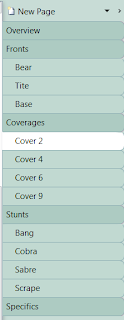It's Not Enough... In a recent thread on Coach Huey, an argument sprung up surrounding the role of coaches within kids lives. Everyone was very assured that they, in fact, were correct and it was more than a little bit heated, which was unfortunate. It began with a video being posted of QB guru and expert Darin Slack, where he passionately lays out his case for the kids to become aware that the QB position is "Not about you". This is an interesting issue to me because I feel that it closely ties in with
Viktor Frankl's book that I recently discussed/introduced.
We're Famous For Our Masochism
Football coaches are particularly famous for the amount of time, energy, money, etc that we put into our passion. My uncle, a very successful coach who lives about an hour away, has more or less forsaken the idea of having his own children because he could never find a woman who could come to terms with the fact that every year he has a family of around 150 children. Every volunteer coach I know gives up money they could be making in order to be there. Every teaching coach I know has taken a voluntary vow of poverty (almost extreme poverty in our district) as part of the gig.
Every offseason we go to clinics, we visit colleges, we have informal sit-downs over BBQ and suds, in an effort to do the things we do BETTER than we've done it before. We buy DVDs, we read books (!), we visit message boards and post stupid questions that we know are dumb but we ask anyways, because we want the learning and the knowledge. But WHY does all of this matter?
It's More Than Football
There's no crime in being an excellent technical coach. I dare say that it's my dream to be considered an expert at producing great technicians in any position. Teaching the technical skills necessary for the game is critical, we cannot roll a ball out and have the team scrimmage for a half hour and expert meaningful improvement. Tim Murphy, one of the most successful coordinators of the double-wing offense, an offense that is largely used to beat up and roll over and physically assert oneself on the opponent, is a fantastic coach of the offensive line.
But the problem for me comes down to this: we cannot only coach the technical skills of our players. We have to coach the whole athlete, all of them, not just coach what we need them to be able to execute. We have to address their personal deficiencies in addition to their athletic ones. We must take EVERY aspect of them and do our damnedest to make ALL of them better, because not doing so is not enough.
You're Overstepping Your Bounds
Maybe. But I don't think so. There's a reason why we have interscholastic sports and it's not fundraising. The purpose behind interscholastic sports is in the meaning of the word extracurricular, which is what sports are. They're for the purpose of going BEYOND the curriculum, they are there to teach something that will not and cannot be learned within the walls of the classrooms.
Now I am not saying that we must all become avatars of His Holiness, Sir Timothy Tebow or disciples of Joe Ehrmann, but we need to have a goal within our programs to improve every aspect of our players, not just their technical skills and physical ability. You can do this in any number of ways, from outwardly preaching and proselytizing, to selecting a scheme that develops the kinds of character you want, to running an offseason weights program that enhances these things, the options are numerous and varied. But you need to do something. Failing to address your players inadequacies or deficiencies is unacceptable because we cannot be content to simply produce more football players. Football will end one day, but their lives will stretch much further and be much more influential. When football is over, our work at creating the best technical player is done and gone, but our work at creating the best PERSON will continue and carry on for quite some time.
Copy-Paste-Fin
These are my final thoughts from the last response in the Coach Huey thread and I think it fits nicely here:
At the end of the day, it cannot only be about the football. If it's only about the football, then I will have wasted every moment of every day that I've spent working on football, both as a coach and as a player. There has to be more to it than just football or this world would've been better off without me, and that's one thing I won't have.










